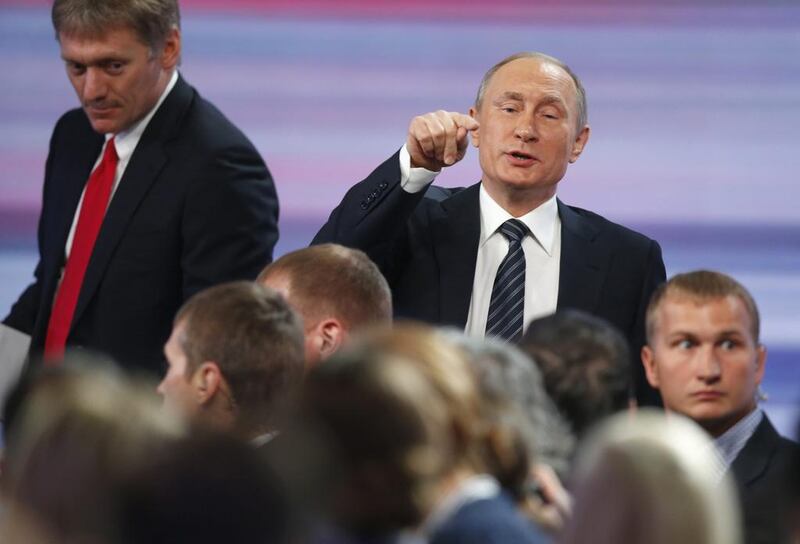MOSCOW // President Vladimir Putin insisted Thursday that Russian forces in Syria are providing air support to some of the opposition groups fighting ISIL, as global powers prepare for a new round of peace talks.
Addressing an annual news conference in Moscow, Mr Putin said Russia was co-operating with the United States over Syria.
However he directed criticism at Turkish president Recep Tayyip Erdogan’s government, accusing it of “licking the Americans in one place.”
The Russian strongman reiterated claims that Moscow was in contact with the “armed, uncompromising” opposition in Syria.
“We support their efforts in fighting ISIL with Russian air strikes,” he said.
He did not say what rebel groups he was referring to.
Syria’s rebel forces have regularly rejected the possibility of co-operating with the Syrian region or with Russia and there has been no evidence of such cooperation.
Mr Putin said last week that Russia was backing the Free Syrian Army (FSA) with arms in joint operations with regime forces.
On Wednesday, the chief of staff of the moderate Free Syrian Army General Ahmad Berri denied receiving any Russian support, but said that Moscow had provided aid to the Kurdish Democratic Union Party’s armed wing.
Moscow insists its campaign in Syria is aimed at destroying ISIL and other terrorist groups in the war-torn country.
But members of a US-led coalition complain that Russia is mainly hitting groups fighting Syria President Bashar Al Assad, and NGOs and observers have alleged civilian casualties.
Mr Putin’s claim came ahead of a meeting of the foreign ministers from 17 countries including key players Russia, Iran, Saudi Arabia and the United States in New York on Friday for a third round of talks on ending Syria’s nearly five-year war.
At the last round, the so-called International Syria Support Group (ISSG) agreed to UN-led peace talks and a ceasefire in January, and to put in motion a political transition within six months, leading to elections and a new constitution in 18 months.
Russia and the United States said the latest round of negotiations to try to halt Syria’s civil war would go ahead after Mr Putin hosted US secretary of state John Kerry for high-stakes talks at the Kremlin on Tuesday.
Mr Putin said Russia supported the US-backed draft resolution aimed at ramping up sanctions against the IS group and cutting off its revenue flows.
“On the whole it suits us,” he said.
He added that he believed the Syrian authorities would also accept the draft resolution, urging both sides to compromise.
He also urged joint work on Syria’s new constitution, adding that a “transparent” mechanism is needed that will help Syrians conduct democratic elections and elect a leader.
The Kremlin strongman meanwhile accused the Turkish government of toadying to Washington, as he addressed the downing of a Russian bomber at the Syrian border by Ankara last month.
“Why did they have to do it? What did they achieve?” Mr Putin said.
“If somebody in the Turkish leadership decided to lick the Americans in one place...,” he said to applause from the audience. “I don’t know, if they did the right thing. I don’t know if the Americans need that or not.”
He said the downing of the bomber was especially disappointing because Moscow had agreed at a G20 summit in Turkey last month to assist Ankara on some of “very sensitive” issues.
“Our Turkish colleagues had raised some very sensitive issues and asked us for support,” Mr Putin said, adding those issues apparently contravened international law.
“We said: ‘Yes, we understand and are ready to help you,’” Mr Putin said without providing more details.
After Turkey shot down the Russian bomber, claiming it had violated its airspace, Mr Putin accused Ankara of a “stab in the back” and introduced a raft of sanctions against the Turkish economy.
“We find it difficult if not impossible to come to an agreement with the current leadership of Turkey,” the Russian president said.
“On the state level, I don’t see any prospects of improving relations with the Turkish leadership.”
* Agence France-Presse





